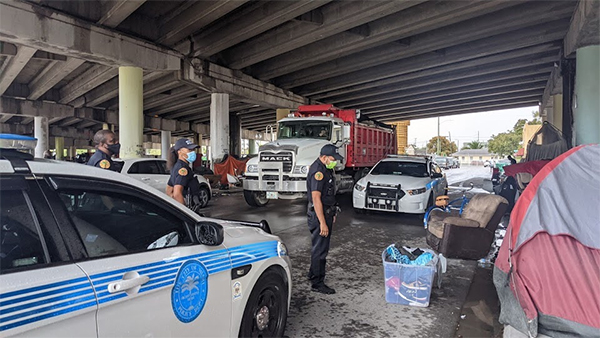
Photo / A. Soleil.
MIAMA, FL — A phrase, a name, the mention of a city can conjure meanings that come to mind automatically.
If that city happens to be Miami, one may think mojitos on the beach, or the place where Muhammad Ali began his path to becoming both icon and pariah, depending on which side of the political fence one plants their feet.
Too rarely is Miami recognized for its other, more repugnant, realities.
This is the Miami led by arguably the most right-wing government of any major US city, where the waves of McCarthyism have never ebbed. The Miami where profound corruption in its politics and policing is the accepted norm. And the Miami where homeless people are brutalized on a daily basis despite the sweet lip service that’s been perfected by the NGO purveyors of the homelessness-industrial complex.
Recently, dating back to early 2021, led by the Miami PD and employing the services of homeless outreach workers known as Green Shirts, whose job description is to offer services, the assaults on those encamped on the city’s streets took an even more aggressive turn than usual.
In August, the city’s barbarism attained new heights when dozens upon dozens had all of their property confiscated and destroyed, from tents to vital medicines, ID’s and family photos, one man’s years long research to create a family tree, and one woman’s last and more direct connection to family, the urn containing her mother’s ashes. All of it, by the light of the equally relentless Miami sun, went to the dump.
To highlight the extent of the harm, as one man I interviewed told me, “We value our stuff more than housed people.”
Then came the camping ban.
First proposed in late summer by uber-conservative Commissioner Joe Carollo, the measure was passed on a 4 -1 vote on October 28. Carollo, for the record, has long been in the habit of referring to his political enemies, mostly Democrats, as Communists. (We who are actual Communists are duly humored.)
This odious law, which was opposed at commission meetings by many dozens of people and groups, including the ACLU, NLG, the National Homelessness Law Center and at least two dozen local social justice org’s, will criminalize even the simple and life-sustaining act of sleeping on a piece of cardboard in any public space in the city. As things stand, it will go into effect on November 27, two days after Thanksgiving and just in time for the holiday season. By comparison, a lump of coal in a stocking would be an enviable gift.
Those of us who advocate for and with our sisters and brothers on the streets are far from done with this fight. The lawyers, we expect, will do what lawyers do, and out of that may come a modicum of relief.
But the struggle we advocates bring is not a legal fight but a moral one and, more basically, one that is rooted in politics and economy.
The lack of affordable housing in Miami, recently rated the second least affordable market in the country, is notoriously heinous, and screams to a system where even holding a decent job is no guarantee of holding onto a roof over one’s head.
But that part of the story, in this neoliberal hell where housing is more about providing an investment opportunity for the rich than a home for the rest of us, is not just a Miami tale.
Jeff Weinberger, founder of the October 22nd Alliance to End Homelessness, has been advocating for the rights of people experiencing homelessness in south Florida for over 12 years.
Jeff Weinberger, founder of the October 22nd Alliance to End Homelessness, has been advocating for the civil rights of people experiencing homelessness for 15 years. His street outreach has led to successful federal lawsuits to overturn unconstitutional bans on panhandling in several Florida cities, and to end the City of Miami’s indiscriminate trashing of homeless folks’ property.
